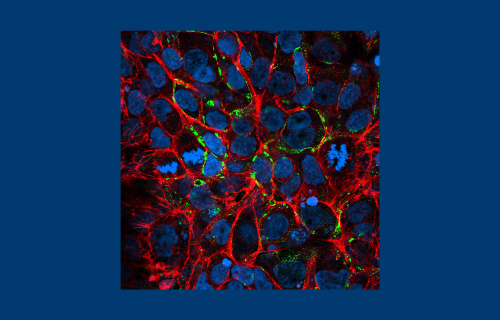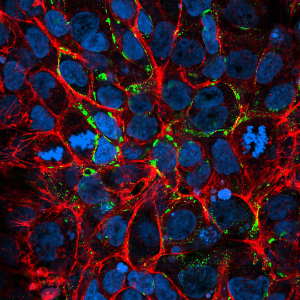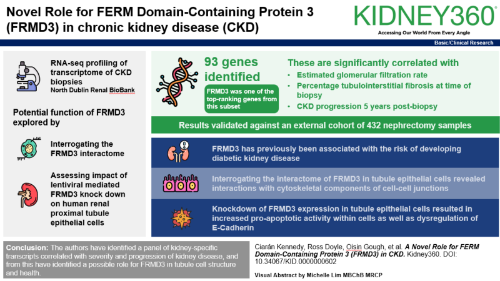New research better understands how a person’s genetic makeup affects the progression of chronic kidney disease
Monday, 25 November, 2024
Share

 Congratulations to Dr Ciarán Kennedy, Dr Eoin Brennan, Dr Darrell Andrews, Mr Andrew Gaffney, Prof Catherine Godson, Dr Ross Doyle and all involved in their research published in KIDNEY360, ‘A Novel Role for FERM Domain-Containing Protein 3 (FRMD3) in CKD’.
Congratulations to Dr Ciarán Kennedy, Dr Eoin Brennan, Dr Darrell Andrews, Mr Andrew Gaffney, Prof Catherine Godson, Dr Ross Doyle and all involved in their research published in KIDNEY360, ‘A Novel Role for FERM Domain-Containing Protein 3 (FRMD3) in CKD’.
Colleagues from the UCD Diabetes Complications Research Centre worked with several collaborators to identify a panel of kidney-specific transcripts correlated with severity and progression of kidney disease, for which they have now identified a possible role for FRMD3 in tubule cell structure and health.
To better understand how a person’s genetic makeup affects the progression of chronic kidney disease (CKD), the team identified a panel of 93 genes whose expression in human kidney biopsies is associated with CKD severity and with disease progression over a 5-year period. One of the genes most associated with these factors is FRMD3, which the team have shown contributes to the structural integrity of cells within the kidney tubule. The results of this study will hopefully contribute to a better understanding of the mechanisms surrounding CKD development and progression.
Funding support was received via an SFI US-Ireland R&D Partnership as part of the GENIE consortium (GEnetics of Nephropathy - an International Effort). Collaborators were from the USA (Broad Institute - Harvard, Michigan School of Medicine, University of Pennsylvania, University of California San Diego), Northern Ireland (Queens University Belfast), and Finland (Folkhälsan Research Centre, Helsinki). Partnerships with clinical colleagues included Prof Denise Sadlier (UCD - Mater Misericordiae University Hospital) and Prof Peter Conlon (RCSI - Beaumont Hospital) with the North Dublin Renal Biobank (NDRBB), and generous support through the UCD Foundation.
Abstract
Background:
Currently there are limited methods to link disease severity and risk of disease progression in Chronic Kidney Disease (CKD). To better understand this potential relationship, we interrogated the renal transcriptomic profile of individuals with CKD with measures of CKD severity and identified FERM-domain containing protein 3 (FRMD3) as a candidate gene for follow-up study.
Methods:
 RNA-seq was used to profile the transcriptome of CKD biopsies from the North Dublin Renal BioBank the results of which were correlated with clinical parameters. The potential function of FRMD3 was explored by interrogating the FRMD3 interactome and assessing the impact of lentiviral mediated FRMD3 knock down on human renal proximal tubule epithelial cells by assessing cell viability, metabolic activity, and structural markers.
RNA-seq was used to profile the transcriptome of CKD biopsies from the North Dublin Renal BioBank the results of which were correlated with clinical parameters. The potential function of FRMD3 was explored by interrogating the FRMD3 interactome and assessing the impact of lentiviral mediated FRMD3 knock down on human renal proximal tubule epithelial cells by assessing cell viability, metabolic activity, and structural markers.
Results:
We identified a subset of 93 genes which are significantly correlated with estimated glomerular filtration rate and percentage tubulointerstitial fibrosis at time of biopsy and with CKD progression 5 years post-biopsy. These results were validated against transcriptomic data from an external cohort of 432 nephrectomy samples. One of the top-ranking genes from this subset, FRMD3, has previously been associated with the risk of developing diabetic kidney disease. Interrogating the interactome of FRMD3 in tubule epithelial cells revealed interactions with cytoskeletal components of cell-cell junctions. Knockdown of FRMD3 expression in tubule epithelial cells resulted in increased pro-apoptotic activity within the cells as well as dysregulation of E-Cadherin.
Conclusions:
 We have identified a panel of kidney-specific transcripts correlated with severity and progression of kidney disease, and from this have identified a possible role for FRMD3 in tubule cell structure and health.
We have identified a panel of kidney-specific transcripts correlated with severity and progression of kidney disease, and from this have identified a possible role for FRMD3 in tubule cell structure and health.
(opens in a new window)Link to KIDNEY360.
Photo: Dr Ciarán Kennedy